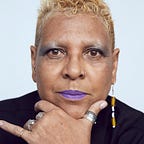Queer Activism in Ghana: An Ongoing Struggle : Part III
Anima Adjepong and Shakia Asamoah
What queer community organizers are up against
The increased advocacy and activism of queer Ghanaians and allies has placed a spotlight on the institutional actors who propagate violence against the community. This trifecta of institutional actors include the state, media, and religious organizations. It is important to emphasize that the Ghanaian state colludes with religious institutions and the media to sustain cultural and societal suppression of queer people. The collusion of these three entities, religious organizations, the media, and the state, has created a web that entraps queer Ghanaians in a state of constant violence and suppression. For example, right now, Ghana’s parliament is attempting to pass a new bill that will explicitly criminalize queerness and any advocacy on behalf of queer people. This bill has received support from national religious groups and Ghanaian media uncritically parrots the talking points of police, parliamentarians, and clergy who seek to silence and oppress queer and trans* Ghanaians.
A key religious entity in the oppression of queer and trans* Ghanaians is the National Coalition for Proper Human Rights and Family Values. This group, which has close ties to Western religious institutions such as the Vatican and U.S. American group World Congress of Families (WCF), has sustained a public campaign to criminalize queerness in Ghana since 2013. Repeating earlier colonial arguments, the group has declared queer sexuality oppositional to Ghanaian culture and identity, and called for the torture of queer Ghanaians through conversion therapy. The National Coalition also has close ties to the Ghanaian government, even sponsoring the Private Members bill to be introduced in parliament to criminalize queer sexuality.
Just as religious groups work closely with the government to suppress LGBTQI existence and organizing, the Ghanaian press is also complicit in this oppression. From publishing sensationalist stories about queer people, to constantly providing platforms to anti-queer religious figures and politicians, the media has demonstrated their opposition to the liberation of queer Ghanaians. Media bias is further demonstrated by their refusal to fact-check anti-queer guests and to provide the same platforms to queer people as they do to bigots. The Ghanaian media’s treatment of queer Ghanaians’ struggle for liberation works to rile up and sustain cultural and societal violence. Despite the touting of the press freedoms they are afforded, the Ghanaian media consistently chooses to repeat the violent rhetoric of the state when it comes to LGBTQI populations. As such, the media has remained complicit in state and religious oppression of queer Ghanaians.
The Ghanaian government fails to recognize queer Ghanaians as humans. This failure is evidenced by ongoing legislative debates and government inaction concerning equal rights and liberties for queer and trans* Ghanaians. The Ghanaian state has long-postured itself as progressive on a continent that has a reputation of violent suppression and authoritarianism. Ghana has signed on to various humanitarian treaties including African Charter on Human and People’s Rights, which guarantees rights to personal liberties and protection, as well as freedom of association and assembly. Yet the government continues to actively oppress and discriminate against people identified as LGBTQI including the recent arrest of 21 activists engaged in paralegal training. The label of ‘unnatural’ in Section 104 and its assumed application to queer people reinforces the societal and religious denigration of queer and trans* Ghanaians. This law justifies state suppression and dehumanization.
A legislative change — the repeal of Section 104 — is required. Although Section 104 has rarely been implemented to criminalize particular individuals, it stands as a threat to anyone whose gender and sexuality do not conform to Christian colonial logics of binary gender and monogamous heterosexuality. The recent police raid of a suspected lesbian wedding is an example of how this law is used to threaten those perceived as not conforming to heterosexuality. The repeal of Section 104 clears a path for procuring the legal protections that queer and trans* Ghanaians have been seeking for so many years. The law as it stands justifies the dangerous assaults that the community faces and its repeal can ease off some of this harm.
